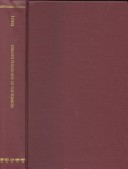Works in the Philosophy of Science 1830-1914
1 total work
The philosophy of science as it is known today emerged out of a combination of three traditional concerns: the classification of the sciences, methodology and the philosophy of nature. Included in the series "Works in the Philosophy of Science 1830-1914" are all three of these interrelated areas. The titles should be of interest to both the philosopher of science and to the historian of ideas. The former will be able to trace present-day concerns back to their origins; the latter should find it a useful source for the study of Victorian conceptions of science. Best known as the common-law husband of George Eliot, George Henry Lewes as a popularizer of science, as demonstrated in this, one of his earlier works. It provides a lucid exposition of Comte's views about the classification of the sciences and the supposedly inevitable tendency of metaphysics to give way to "positive" science.
